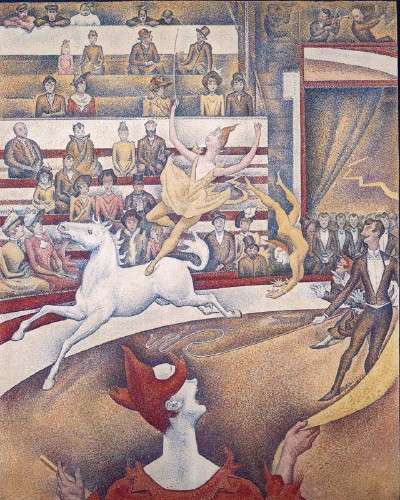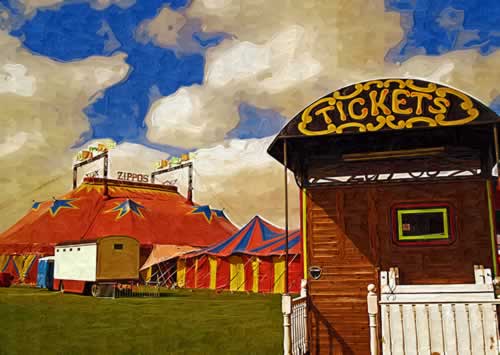author of Charlotte’s Web
After the lions had returned to their cages, creeping angrily through the chutes, a little bunch of us drifted away and into an open doorway nearby, where we stood for a while in semi-darkness watching a big brown circus horse go harumphing around the practice ring. His trainer was a woman of about forty, and the two of them, horse and woman, seemed caught up in one of those desultory treadmills of afternoon from which there is no apparent escape. The day was hot, and we kibitzers were grateful to be briefly out of the sun’s glare. The long rein, or tape, by which the woman guided her charge counterclockwise in his dull career formed the radius of their private circle, of which she was the revolving center; and she, too, stepped in a tiny circumference of her own, in order to accommodate the horse and allow him his maximum scope. She had on a short-skirted costume and conical straw hat. Her legs were bare and she wore high heels, which probed deep into the loose tanbark and kept her ankles in a state of constant turmoil. The great size and meekness of the horse, the repetitious exercise, the heat of the afternoon, all exerted a hypnotic charm that invited boredom; we spectators were experiencing a languor—we neither expected relief nor felt entitled to any. We had paid a dollar to get into the grounds, to be sure, but we had got our dollar’s worth a few minutes before, when the lion tamer’s whiplash had got caught around a toe of one of the lions. What more did we want for a dollar?
Behind me I heard someone say, “Excuse me, please,” in a low voice. She was halfway into the building when I turned and saw her—a girl of sixteen or seventeen, politely threading her way through us onlookers who blocked the entrance. As she emerged in front of us, I saw that she was barefoot, her dirty little feet fighting the uneven ground. In most respects she was like any of the two or three dozen showgirls you encounter if you wander about the winter quarters of Mr. John Ringling North’s circus, in Sarasota—cleverly proportioned, deeply browned by the sun, dusty, eager, and almost naked. But her grave face and the naturalness of her manner gave her a sort of quick distinction and brought a new note into the gloomy octagonal building where we had all cast our lot for a few moments. As soon as she had squeezed through the crowd, she spoke a word or two to the older woman, whom I took to be her mother, stepped into the ring, and waited while the horse coasted to a stop in front of her. She gave the animal a couple of affectionate swipes on his enormous neck and then swung herself aboard. The horse immediately resumed his rocking canter, the woman goaded him on, chanting something that sounded like, “Hop! Hop!”
In attempting to recapture this mild spectacle, I am merely acting as a recording secretary for one of the oldest societies—the society of those who, at one time or another, have surrendered, without even a show of resistance, to the bedazzlement of a circus rider. As a writing man, or secretary, I have always felt charged with the safekeeping of all unexpected items of worldly or unworldly enchantment, as though I might be held personally responsible if even a small one were to be lost. But it is not easy to communicate anything of this nature. The circus comes as close to being the world in a microcosm as anything I know; in a way, it puts all the rest of show business in the shade. Its magic is universal and complex. Out of its wild disorder comes order; from its rank smell rises the good aroma of courage and daring; out of its preliminary shabbiness comes the final splendor. And buried in the familiar boast of its advance agents lies the modesty of most of its people. For me the circus is at its best before it has been put together. It is at its best at certain moments when it comes to a point, as through a burning glass, in the activity and destiny of a single performer out of so many. One ring is always bigger than three. One rider, one aerialist, is always greater than six. In short, a man has to catch the circus unawares to experience its full impact and share its gaudy dream.

The ten-minute ride the girl took achieved—as far as I was concerned, who wasn’t looking for it, and quite unbeknownst to her, who wasn’t even striving for it—the thing that is sought by performers everywhere, on whatever stage, whether struggling in the tidal currents of Shakespeare or bucking the difficult motion of a horse. I somehow got the idea she was just cadging a ride, improving a shining ten minutes in the diligent way all serious artists seize free moments to hone the blade of their talent and keep themselves in trim. Her brief tour included only elementary postures and tricks, perhaps because they were all she was capable of, perhaps because her warm-up at this hour was unscheduled and the ring was not rigged for a real practice session. She swung herself off and on the horse several times, gripping his mane. She did a few knee-stands—or whatever they are called—dropping to her knees and quickly bouncing back up on her feet again. Most of the time she simply rode in a standing position, well aft on the beast, her hands hanging easily at her sides, her head erect, her straw-colored ponytail lightly brushing her shoulders, the blood of exertion showing faintly through the tan of her skin. Twice she managed a one-foot stance—a sort of ballet pose, with arms outstretched. At one point the neck strap of her bathing suit broke and she went twice around the ring in the classic attitude of a woman making minor repairs to a garment. The fact that she was standing on the back of a horse while doing this invested the matter with a clownish significance that perfectly fitted the spirit of the circus—jocund, yet charming. She just rolled the strap into a neat ball and stowed it inside her bodice while the horse rocked and rolled beneath her in dutiful innocence. The bathing suit proved as self-reliant as its owner and stood up well enough without benefit of a strap.
The richness of the scene was in its plainness, its natural condition—of horse, of ring, of girl, even to the girl’s bare feet that gripped the bare back of her proud and ridiculous mount. The enchantment grew not out of anything that happened or was performed but out of something that seemed to go round and around and around with the girl, attending her, a steady gleam in the shape of a circle—a ring of ambition, of happiness, of youth. (And the positive pleasures of equilibrium under difficulties.) In a week or two all would be changed, all (or almost all) lost: the girl would wear makeup, the horse would wear gold, the ring would be painted, the bark would be clean for the feet of the horse, the girl’s feet would be clean for the slippers she’d wear. All, all would be lost.
As I watched with the others, our jaws adroop, our eyes alight, I became painfully conscious of the element of time. Everything in the hideous old building seemed to take the shape of a circle, conforming to the course of the horse. The rider’s gaze, as she peered straight ahead, seemed to be circular, as though bent by force of circumstance; then time itself began running in circles, so the beginning was where the end was, and the two were the same, and one thing ran into the next and time went round and round and got nowhere. The girl wasn’t so young that she did not know the delicious satisfaction of having a perfectly behaved body and the fun of using it to do a trick most people can’t do, but she was too young to know that time does not really move in a circle at all. I thought: “She will never be as beautiful as this again”—a thought that made me acutely unhappy—and a flash in my mind (which is too much of a busybody to suit me) had projected her twenty-five years ahead, and she was now in the center of the ring, on foot, wearing a conical hat and hi-heeled shoes, the image of the older woman, holding the long rein, caught in the treadmill of an afternoon long in the future. “She is at that enviable moment in life [I thought] when she believes she can go once around the ring, make one complete circuit, and at the end be exactly the same age as at the start. Everything in her movements, her expression, told you that for her the ring of time was perfectly formed, changeless, predictable, without beginning or end, like the ring in which she was traveling at this moment with the horse that wallowed under her. And then I slipped back into my trance and time was circular again—time, passing quietly with the rest of us, so as not to disturb the balance of a performer.
Her ride ended as casually as it had begun. The older woman stopped the horse, and the girl slid to the ground. As she walked toward us to leave, there was a quick, small burst of applause. She smiled broadly, in surprise and pleasure; then her face suddenly regained its gravity and she disappeared through the door.
It has been ambitious and plucky of me to attempt to describe what is indescribable, and I have failed, as I knew I would. But I have discharged my duty to my society; and besides, a writer, like an acrobat, must occasionally try a stunt that is too much for him. At any rate, it is worth reporting that long before the circus comes to town, its most notable performances have already been given. Under the bright lights of the finished show, a performer need only reflect the electric candle power that is directed upon him; but in the dark and dirty old training rings and in the makeshift cages, whatever light is generated, whatever excitement, whatever beauty, must come from original sources—from internal fires of professional hunger and delight, from the exuberance and gravity of youth. It is the difference between planetary light and the combustion of stars.

